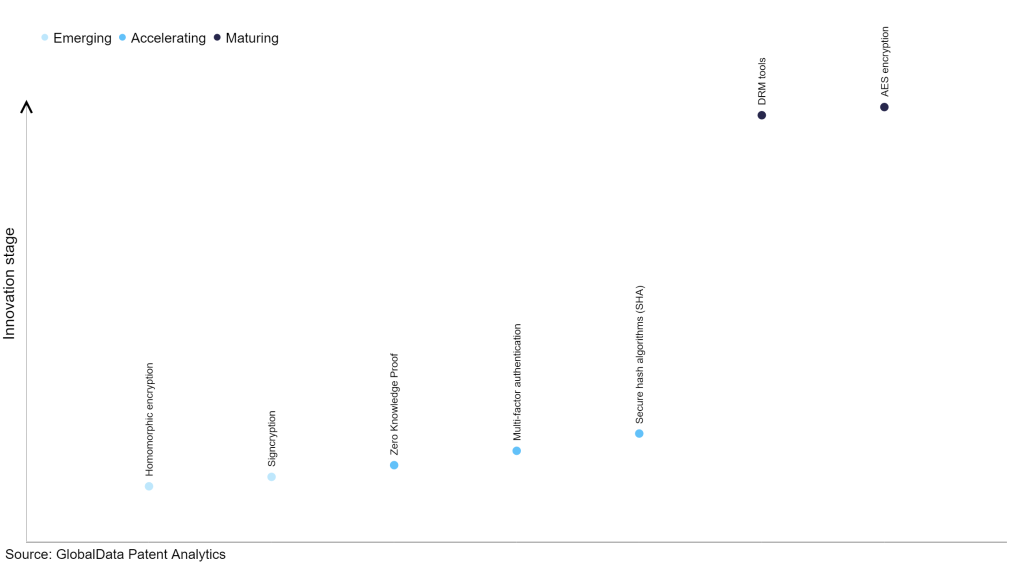The technology industry continues to be a hotbed of patent innovation. Activity is driven by the increasing demand for secure, resilient, and censorship-resistant data storage and distribution solutions, the need for robust and decentralized file storage and sharing solutions, efficient content delivery, improved data redundancy, and reduced reliance on centralized servers. The growing importance of distributed hash tables (DHTs), MerkleDag data structures, and cryptographic algorithms technologies is further driving innovation in the industry. In the last three years alone, there have been over 1.5 million patents filed and granted in the technology industry, according to GlobalData’s report on Cybersecurity in technology: interplanetary file systems. Buy the report here.
However, not all innovations are equal and nor do they follow a constant upward trend. Instead, their evolution takes the form of an S-shaped curve that reflects their typical lifecycle from early emergence to accelerating adoption, before finally stabilizing and reaching maturity.
Identifying where a particular innovation is on this journey, especially those that are in the emerging and accelerating stages, is essential for understanding their current level of adoption and the likely future trajectory and impact they will have.
185+ innovations will shape the technology industry
According to GlobalData’s Technology Foresights, which plots the S-curve for the technology industry using innovation intensity models built on over 1.6 million patents, there are 185+ innovation areas that will shape the future of the industry.
Within the emerging innovation stage, homomorphic encryption and signcryption, are disruptive technologies that are in the early stages of application and should be tracked closely. Zero knowledge proof, multi-factor authentication and secure hash algorithms (SHA) are some of the accelerating innovation areas, where adoption has been steadily increasing. Among maturing innovation areas are DRM tools and AES encryption, which are now well established in the industry.
Innovation S-curve for cybersecurity in the technology industry

Interplanetary file systems is a key innovation area in cybersecurity
Interplanetary File Systems (IPFS) are a decentralized and peer-to-peer network protocols specifically designed for the storage and transfer of data across computer networks. With IPFS, users can securely store and access large volumes of data on a distributed network of computers. By utilizing this protocol, data is stored and retrieved in a highly efficient and reliable manner, ensuring reliable data storage and retrieval in a distributed environment. IPFS offers a decentralized approach to data storage, reducing reliance on centralized servers and providing users with the ability to access their data from anywhere with an internet connection.
GlobalData’s analysis also uncovers the companies at the forefront of each innovation area and assesses the potential reach and impact of their patenting activity across different applications and geographies. According to GlobalData, there are 100+ companies, spanning technology vendors, established technology companies, and up-and-coming start-ups engaged in the development and application of interplanetary file systems.
Key players in interplanetary file systems – a disruptive innovation in the technology industry
‘Application diversity’ measures the number of applications identified for each patent. It broadly splits companies into either ‘niche’ or ‘diversified’ innovators.
‘Geographic reach’ refers to the number of countries each patent is registered in. It reflects the breadth of geographic application intended, ranging from ‘global’ to ‘local’.
Patent volumes related to interplanetary file systems
Source: GlobalData Patent Analytics
Dell Technologies is one of the leading patent filers in the interplanetary file systems domain. One of the company’s patents describes a method for managing the migration of virtual file servers in a storage system. The method allows the migration of a virtual file server from a source storage processor to a destination storage processor while enabling concurrent access to the root file system by both processors. This concurrent access continues until the user file systems are fully migrated to the destination storage processor.
Other prominent patent filers in the space include nChain, Pure Storage, Dropbox, and International Business Machines (IBM).
By geographic reach, nChain leads the pack, followed by Dropbox and Netflix. In terms of application diversity, nChain holds the top position, followed by Dell Technologies and Peaxy.
Interplanetary File Systems (IPFS) enables distributed data storage, reducing reliance on centralized servers and improving resilience against failures or censorship. IPFS utilizes content-based addressing, which ensures data integrity and enables efficient content delivery. It also allows for offline access to previously accessed content, making it useful in scenarios with limited or intermittent internet connectivity. IPFS has the potential to transform the landscape of information sharing, content distribution, and decentralized applications.
To further understand how cybersecurity is disrupting the technology industry, access GlobalData’s latest thematic research report on Cybersecurity.
Data Insights
From

The gold standard of business intelligence.
Blending expert knowledge with cutting-edge technology, GlobalData’s unrivalled proprietary data will enable you to decode what’s happening in your market. You can make better informed decisions and gain a future-proof advantage over your competitors.







